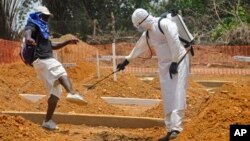Burial teams undertook some of the most hazardous work in Liberia’s fight against Ebola. With the West African nation now getting relief from the virus, these men and women say societal stigma is keeping them from getting jobs.
At the height of Liberia’s Ebola virus outbreak, Emmanuel Johnson left his potato farm and undertook the grim and dangerous job of burying the victims of the virus.
More than 4,800 people would die of the disease in the country.
The World Health Organization declared the outbreak in Liberia over last month. But that has not been good news for Johnson. Though he was never infected, he said the stigma associated with his old job, burying the dead, keeps him from getting work.
“I no get work, I no get work. My farmland, people take the land back. But now I’m just passing all over looking for job, nobody want give me job, some people afraid to give me job because they fear I will give them Ebola,” Johnson said.
Burial workers like Johnson undertook some of the most vital and hazardous work during Liberia’s outbreak. Ebola is transmitted through contact with bodily fluids. Safely burying the bodies of the deceased was key to ridding the country of Ebola, but it was also among the riskiest work, since the bodies of Ebola victims are highly infectious.
Being unemployed is no small thing in Liberia, which was already recovering from nearly two decades of ruinous civil war before Ebola broke out in 2014.
About two-thirds of Liberians live in poverty, according to the World Bank. Sonny Fayon was unemployed when the outbreak started, he found work on a burial team, but now is out of a job again. Even though he never got sick, no one will hire him, he said.
“We’re not very vulnerable to the Ebola business. We’re well-protected, we wore protective clothing to do the job,” Fayon stated. “So they should accept us. I think we were very careful in doing the work.”
The International Federation of Red Cross and Red Crescent Societies was one of the organizations that employed burial teams. Program Coordinator Ademola Alao said even though none of their workers got the virus, they are still being stigmatized. “You know because of the stigmatization and their engagement in the dead body management, you know it was very difficult for them to go back and engage in their normal business,” Alao said.
The Red Cross put about 140 people to work burying bodies during the outbreak. Alao said some of them have continued working with the group as drivers or community workers now that the outbreak is over.
While Liberia is no longer being ravaged by Ebola, new cases of the virus have recently been reported in neighboring Sierra Leone and Guinea. In total, the disease has killed over 11,000 people in the three West African countries.




